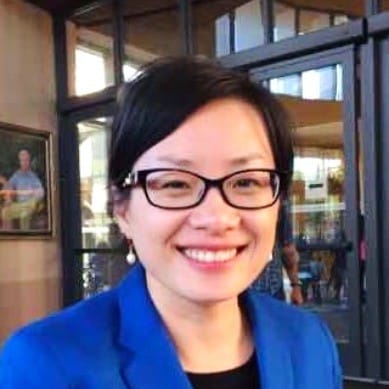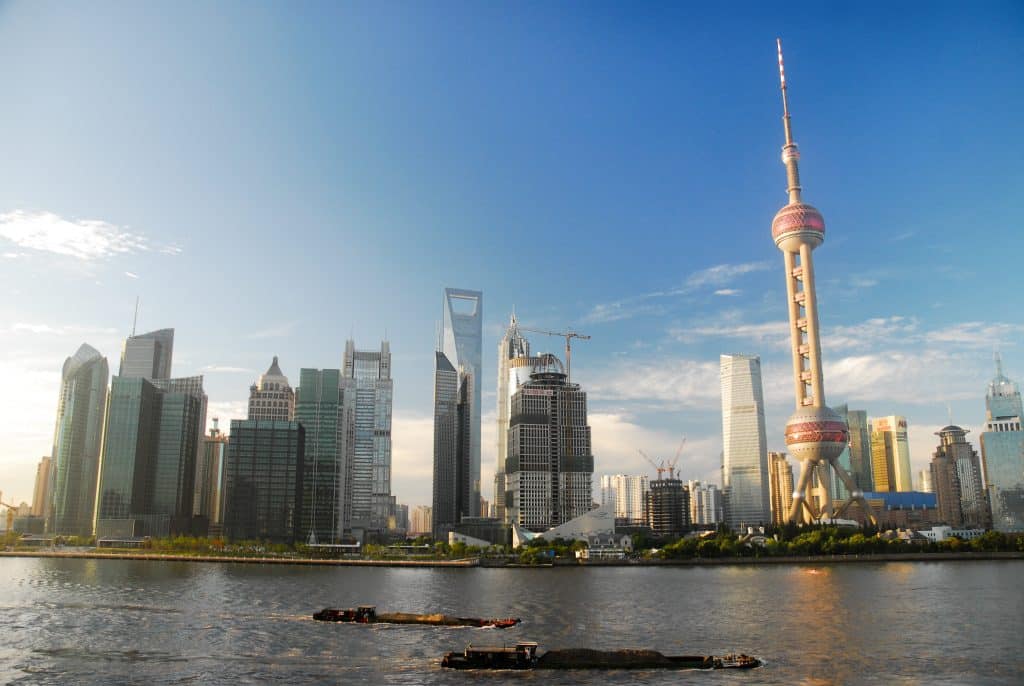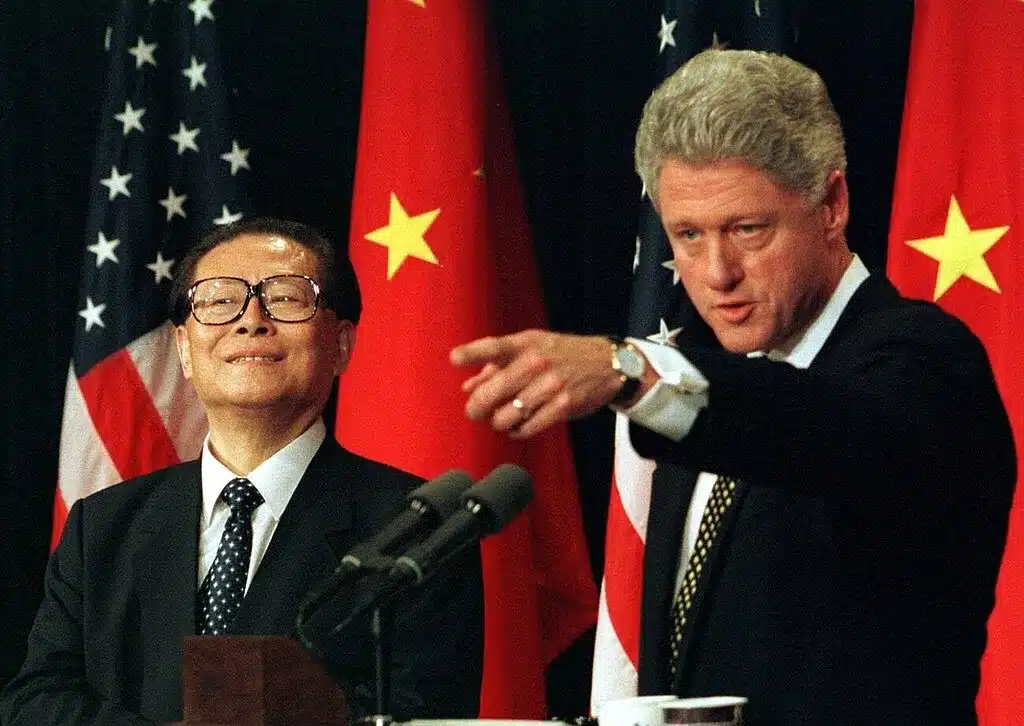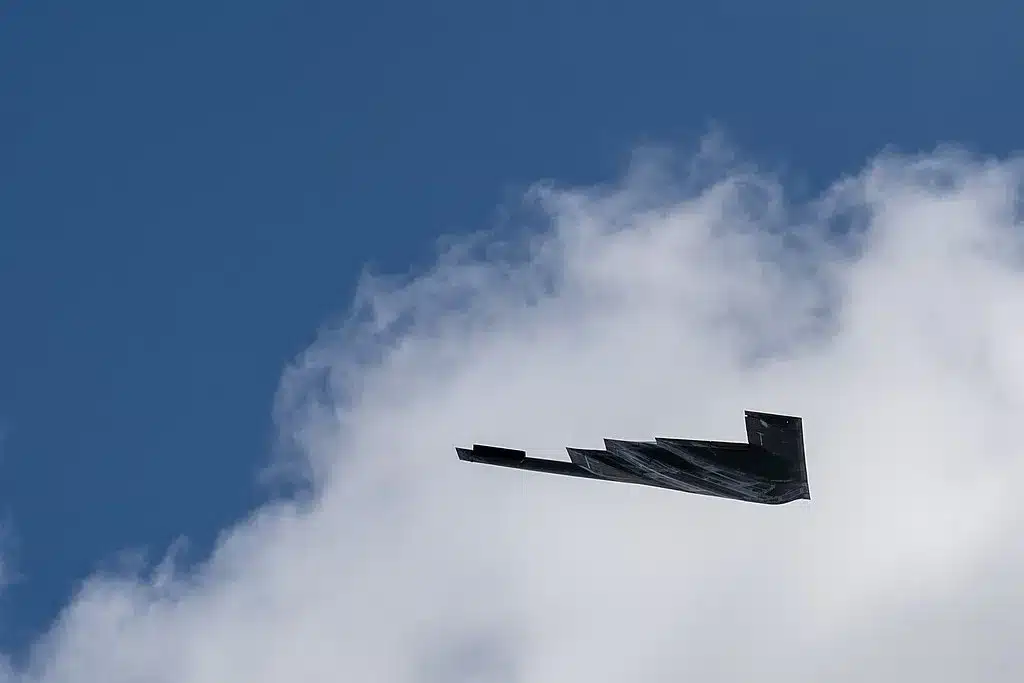David M. McCourt on Engagers, Strategic Competitors, and Adversaries in U.S.-China Relations
- Interviews
 Yawei Liu
Yawei Liu  Juan Zhang
Juan Zhang- 08/17/2023
- 0
Since establishing diplomatic relations, the transformation from engagement to strategic competition has been a far-reaching policy change between the United States and China. Many experts have conducted in-depth analyses of this grand shift from economic, military, and diplomatic perspectives.
Following interviews with 134 experts on China-related issues, sociologist David M. McCourt recently published a widely recognized article analyzing how the engagement policy suddenly shifted towards strategic competition during the Trump administration.
From a sociological standpoint, he examined how the experts who supported the engagement policy were replaced by a new generation advocating for a tougher and more competitive approach toward China. The U.S.-China Perception Monitor recently interviewed McCourt and the following is the original text.
David M. McCourt is an international political sociologist. His primary research interests lie with the social sources of state action in international politics, with an empirical focus on the United Kingdom, the United States, and the European Union. He also is interested in theory – both sociological and international.
As a sociologist, what triggered your interest in researching the significant shift of US-China relations from engagement to strategic competition?
The simple answer is that I am also an international relations scholar. My Ph.D. was in international relations, which I completed in Europe.
European approaches to international relations are more sociological and historical. So I’m a European-style IR scholar, and in America, that makes me a political sociologist, historical, and institutional.
I wasn’t researching a shift at the time in 2015-2016. This was after David Mike Lampton’s famous speech of 2015 (at the Carter Center), where he declared that the U.S. and China “are reaching a tipping point”. But I was beginning to pay serious attention in 2016 and into 2017, just at the beginning of the election and then the Trump administration coming into power.
You used a sociological approach to examine the seismic shift in America’s policy toward China from engagement to strategic competition under the Trump administration. Could you explain your argument?
I argue that the China policy shift represents a paradigmatic turnover in the types of people that went into the Trump administration to staff important positions, and how they framed China and then made new China policy possible. The Trump administration brought in a group of China experts from the China-watching space within Washington, DC, and within the broader national security community, of people I label as “strategic competitors”.
Could you tell us more about the strategic competitors within the Trump administration? Who are they, and what are their essential perspectives?
There were three groups of people that you can call the strategic competitors. One set was coming out of the military security space. Matthew Pottinger is a key member. Randall Schriver is another. They do see China as primarily a military security problem.
The second group of strategic competitors was people who saw China as primarily a problem for economic reasons. Here, Peter Navarro and Robert Lighthizer are key members. Navarro and Lighthizer were looking at China not from the lens of Wall Street or the large multinational corporations but from those companies in the United States and those people that had struggled under off shoring to China. And they actually spoke, in some ways, the closest to the language that Trump himself spoke. I think Trump himself was a strategic competitor in that way.
The final group is what I would characterize as new cold warriors or real China hawks. And people like Stephen Miller, Steve Bannon and Mike Pompeo fit into this basket. They see China as almost an existential threat to American liberal democracy.
Once in power, strategic competitors began closing the door on those old engagers in Washington, stopping listening to them, and starting to listen to other people with much more critical views on China. They set about mostly reframing China, but they didn’t do much policy change until around 2020.
In your papers, you examined the engagement policy through three components, that have played such an instrumental role in US-China relations. Could you share your thoughts in this regard?
I think that engagement had three components: framing, community, and policy. The frame was an overarching narrative that the U.S. and China could get along through an approach called engagement where, by engaging with Beijing, we could bring them into the rules-based international order.
The second aspect is the community aspect, a group of people who believed strongly in engagement, that this was the best way of securing the national interest. David Lampton, Susan Shirk, Ken Lieberthal, and Michel Oksenberg were part of this community that saw US-China relations as not zero-sum but as a positive sum.
The final aspect of engagement was policy, that there were specific actual things that we tried to do with China through economic and strategic dialogues.
Many people sensed that strong China critics under the Trump administration suddenly burst to the scene and swiftly blocked the influence from people who supported the engagement policy. Could you use your theory to explain how this happened so quickly and forcefully?
The puzzle that remains from this paradigmatic turnover from Obama to Trump is how the Trump administration could bring in a set of advisors that thought differently about China, and not only thought differently about China, but were actually legitimate. Why were they worthy of the respect of the broader China-watching community? The obvious answer is that they were speaking the truth that China had changed and therefore United States foreign policy had to change.
I’m talking about the construction of two groups, one called the engagers, and one called the strategic competitors. But crucial to the changeover into the Trump administration was the formation of this group of people called the strategic competitors. The first process that is absolutely key is what I call in the paper “politicization”, but I now call it in the book “polarization”.
For a long time, the US-China watching community was quite a collegial and, in many ways, small group. In the late 1980s and into the 1990s, the number of people with intimate knowledge of China was quite small. But over the course of the 1990s and 2000s, as the field expanded and became less collegial, it also started to fracture increasingly into more hawkish and dovish camps.
How did the strategic competitors emerge? They started to see themselves as different from the engagers. They were younger. They were more sort of focused on military security. They had more criticisms of China’s human rights. That’s the first formation of the opposition group because without this group the Trump administration couldn’t have brought in those who self-identify themselves as strong China critics.
The second process is how that group was also understood to be legitimate. I talk about professional status competition and how the debate over engagement also played into different types of China experts and China watchers.
I call the final process personalization because the creation of these camps wasn’t just about views of China. It wasn’t just about types of expertise. It was a personal story. It was a personal story of, those whose careers had gone very well through engagement and those whose career had perhaps not gone quite so well. Whose views had been important and prominent, and whose hadn’t? Because through the story of US-China relations, there are personalized oppositions, people who dislike others and view others with suspicion because of their investments in US-China relations.
I think that you cannot understand the shift from Obama to Trump without understanding how the strategic competitors managed to close the door to the engagers and convinced the decision makers not to listen to them.
The stories about the shift in US-China relations are ultimately about personal likes and dislikes, personalized views of China, and personal investments. So that’s a really important part of the story.
What are the differences between engagers and strategic competitors?
The engagers, in general, took a more academic, detached viewpoint. They tended to be from either a diplomatic background, an academic background, or a background in concrete engagement with China through universities, business, or person-to-person exchanges. They understood engagement because they were, practically speaking, invested through their profession in engaging with China.
This was different for the strategic competitors, who were much more focused on changing U.S. policy, particularly in a more security-focused direction. They are, on the whole, not the same types of China experts as the engagers. They rely on something other than going to China for their professional success. They are concentrated in the National Security Council and the Pentagon apparatus primarily.
Matthew Pottinger is a key exception. He is a well-respected China expert, speaks Mandarin, and spent a lot of time in Beijing, China with the Wall Street Journal. But for the most part, the strategic competitors are different types of people. Their sources of legitimacy and knowledge are about military matters and national security matters. Many of them are IR theorists. We might think of someone like Aaron Friedberg, John Mearsheimer, or Michael Pilsbury, but they were different from the sort of Mike Oksenbergs and Mike Lamptons.
Can we use the same theory to explain the absence of change in President Biden’s policy toward China?
From the perspective of my approach, the fact that the Biden administration did not move back towards engagement suggests that what happened is that they brought in China experts that were broadly on the same page as the strategic competitors who were willing to work with the strategic competition framework and make policies accordingly.
My approach makes us think that let’s first start with the community. Let’s think about the types of people Biden brought to the administration. Key people here are Kurt Campbell, who was appointed as Indo-Pacific Affairs Coordinator at the National Security Council, and Ely Ratner, a longtime co-author with Campbell and another strong critic of China. Many of these people actually have been around for a long time in the Democratic foreign policy circles on East Asia, but certainly, they fit the profile of the strategic competitors. In many ways, they positioned themselves as strategic competitors during the Trump administration.
In March of 2018, Campbell and Ratner wrote a piece in Foreign Affairs arguing that the United States has gotten China wrong, that we need a China reckoning, and that we need an approach that does not try to change China but deals with China in a much more robust fashion.
If you look at the May 2020 document that the Trump administration puts out called The United States’ Strategic Approach to the PRC, it’s strikingly similar to the foreign affairs piece that Ratner and Campbell wrote. It is a very similar document.
When the Biden administration came in, it did bring in an opportunity to shift to engagement, but the shift did not occur because the administration brought in a community of folks that are on board with the strategic competition.
The strategic competitors under Biden have very different points of emphasis. They agree with the argument of people like Ryan Haas that foreign policy begins at home, and that the way to compete with China is to build up our industrial capacity to work with allies and partners around the world. So that is a point of emphasis quite distinct from the Trump administration, and therefore the framing of strategic competition remained where their heart was.
You mentioned a lot of old China hands like Michel Oksenberg, Kenneth Lieberthal, Jeff Bader, and then you also mentioned Rush Doshi, Laura Rosenberger, and Julian Gewirtz. What is the difference between the old generation of engagers and the new generation of anti-engagement?
That’s a good question in the sense that it is an issue of trajectory into the field and career experience in the field.
I think if we look back at that old generation of engagers, the people who went to China in the late 1970s and the 1980s, and even in some ways even in the 1990s when China was sort of an exotic place to go to. I have heard a lot about people say how that did infuse them with a sense of awe at China, or maybe a little bit of wonder and romance with the place, and a sense of the immense changes that were going on, and therefore they saw the immense changes that were possible through engagement. I think this is personal and professional in a way that many people built their careers on engaging with China, trying to facilitate people-to-people exchanges, trying to make one’s life, career and friendships in thie China field.
Some of the younger scholars-turned-policymakers indeed grew up with China, which was already not a poor developing nation, but almost a great power already. People who went after 2010 in particular and perhaps slightly earlier see China as not a unique power, but a normal great power doing things that normal great powers do. That’s part of the story. Another part of the story is that they are focused mostly on policy and Washington rather than having investments in, say, the university sector. So if you think of someone like Lieberthal and Mike Oksenberg, they were also interested in developing US-China relations beyond the foreign policy space. They were interested in developing academic China centers and facilitating exchanges.
Also, younger scholars have grown up in a context of other issues, perhaps more contentious, the issue of Taiwan and the issue of human rights. Many of those are much more naturally very strongly critical of changes in China, as China has become a more difficult place to go to, a more difficult place to engage with, a country that is doing things that we don’t like and don’t agree with.
Again, it’s not one of those things where there is a simple and definitive answer. Each person comes at their views from slightly different places. Julian Gewirtz is probably more pushed toward engagement than Ely Ratner. People like Kurt Campbell and Ely Ratner are well-respected China experts, but they are not necessarily the same kind as Oksenberg, Lieberthal, or Jeff Bader.
Does Blinken’s recent visit to Beijing manifest the slow comeback of the engagers? Who are the engagers, and who are the non-engagers in the Biden Administration?
I do think that there is a couple of things going on when we look at the Blinken visit and the rhetoric coming out of the Biden administration at the moment. Firstly, I think there was a little bit of fear among the Biden administration that they didn’t want a crisis to develop on their watch, for example, the impacts of the balloon incident.
The second point to be made, I think, is that the Biden administration, from the beginning, had some problems with the term “strategic.” They started to talk about responsible competition or managed competition or managed coexistence. And this was an attempt to distinguish themselves somewhat from the Trump administration. They try to assuage some people’s concerns that were closer to the old engagement view than the strategic competition.
One does get the sense that Jake Sullivan sees the China issue in a broader sense than perhaps someone like Kurt Campbell, and perhaps there might be a little bit of division and fracture inside the administration itself. So, Secretary Blinken’s visit then could be read in a number of different ways, and critics not surprisingly have argued that perhaps this is the emergence of something like engagement again and the return of the old engagers.
But I don’t really think that there is an attempt to reframe US-China relations. I don’t think there is the will to try to do the kind of thing that Pottinger and H.R. McMaster himself achieved in 2017 because it would take an immense amount of rhetorical effort. After all, you can’t use the term engagement anymore.
So, for that reason and also for the reason of the effort involved, I don’t see a new framework and a new community on the horizon. If anything, the old community could perhaps become more powerful again. To strengthen that point, we might think about exactly how much work the Trump administration took to reframe US-China relations. This was a very difficult task. It took them four years, and they were still doing things until almost the very last day of the Trump administration. For example, they were making it easier for U.S. diplomats and Taiwanese diplomats to engage one another. They were calling the events in Xinjiang a genocide, for example.
Fundamentally altering U.S.-China relations happened once since the opening (in 1979). I don’t see it happening again, shifting backward to engagement, especially not again when the Chinese seem to have no real interest in changing any of the major actions and things that they are doing that have prompted the shift to strategic competition in the first place.
Can scholars like you make a difference in telling the story and making the decision-maker aware of pitfalls in looking at the other side? And what can be a more informed decision-making process so that these two countries will not get into a conflict?
I hope that policymakers will listen to as diverse a group of thinkers as possible and that we will live up to the best ideals of Washington, which is the idea of a real robust marketplace of ideas, rather than slip into something like group-think or capture by a particular group, and keep open the space for debate rather than closing it down, push back against ideas that engagement is a sign of weakness.
Can we conclude this interview with you talking about your new book?
Yes, I’m just making the final revisions now. It should be done by the end of the summer.
The book is called The End of Engagement: America’s China and Russia Experts and US Strategy Since the Cold War. It compares America’s China-watching community with America’s Russia-watching community, where there has not been the same type of paradigmatic turnover away from engagement towards a more competitive approach, which shows something quite specific about China and why the framing turnover was actually specific to China. This is not something that America has done with any other nation, which is very interesting.







